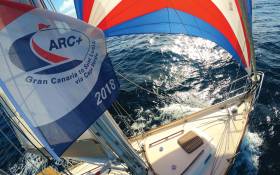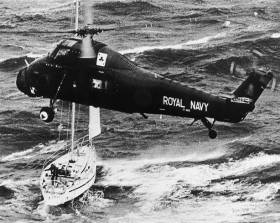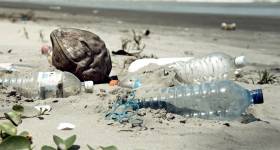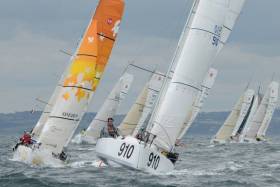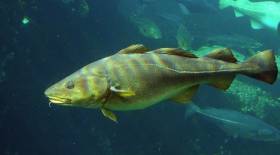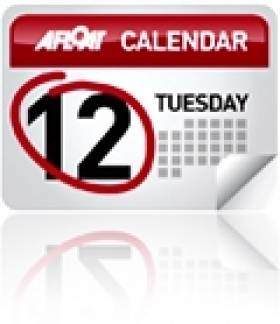Displaying items by tag: lecture
’200 Years of the Coastguard in Ireland’ Lecture Hosted by Dublin Bay Old Gaffers at Poolbeg Y&BC This Thursday
The Dublin Bay Old Gaffers Association will host an illustrated lecture next week by Joe Ryan reflecting on the coastguard in Ireland over the last 200 years.
Joe spent 12 years at sea as a radio officer responsible for the safety of lives at sea. He spent 15 years as a computer engineer and software advisor, and 20 years as a search and rescue co-ordinator with the Irish Coast Guard before his retirement in 2014.
He has been a supporter of the Maritime Institute and their lectures since 1995, and he gave their keynote lecture in 2014 on the coastguard from 1822 to 2014, “Hands Around the Country”, which later became a PDF booklet, as previously reported on Afloat.ie.
Joe says this upcoming lecture is not a rehash of his previous address, and will instead reflect on key moments of the Irish Coast Guard and its predecessor bodies over the last two centuries.
The lecture takes place this Thursday 23 February at 8pm at the Poolbeg Yacht and Boat Club. All are welcome and donations for Howth RNLI may be made at the door. Early attendance is recommended to be sure of a seat.
The talk will also be streaming live on Zoom for those who cannot attend in person (details on request from [email protected]).
Lecture: “Transatlantic to the Caribbean-the Story of the ARC 2018”
The next Friends of Glenua lecture to be held on Thursday, 7th November takes place at the Poolbeg Yacht and Boat Club, in Ringsend, Dublin.
As previously reported on Afloat the same Dublin venue is where a series of other separate lectures will begin the following week.
As for the Glenua organised lecture as usual this will be in aid of the RNLI. This second lecture of the winter series is titled: Transatlantic to the Caribbean-the Story of the ARC 2018. This is to be presented by Dolores Murray.
The Atlantic Rally for Cruisers (ARC) is an annual transatlantic sailing event for cruiser yachts, held since 1986. It also includes a sailing competition for racers. The ARC is the largest trans-ocean sailing event in the world and regularly attracts over 200 boats of many different shapes and sizes. More than just a boat race, the ARC is about friendships made ashore in the two weeks of pre-departure activities in the Canaries Island and continued over the radio net at sea and at the various destinations on the way.
In her lecture Dolores will tell the story of how she became involved in the ARC in 2018, the preparations, training, trials and tribulations, and tradewinds, culminating in a successful transatlantic crossing.
Dolores is a sailing instructor who started her sail training in Croatia in 2001 and swiftly moved on to continue her training with GISC (Glenans Irish Sailing School) in 2001. Her sailing experience, prior to taking part in the ARC, was around the south-west coast of Ireland, an annual week in various Mediterranean areas and a delivery trip from Paimpol, Brittany in France to West Cork.
Lecture: “Back to the Rock-Fastnet '79” Launches Series at the Poolbeg Y&BC, Ringsend, Dublin
Once again the Friends of Glenua launch their annual winter season of lectures with the 2019/20 programme held in Dublin at the Poolbeg Yacht & Boat Club, Ringsend.
“Back to the Rock- Fastnet '79” is the title of the opening lecture in aid of the RNLI. This it take place on Thursday 17th October (at 8pm) at the venue located on Pigeon House Rd, Dublin 4. There will be an entry contribution of €5 in aid of the RNLI.
The speaker is John O’Donnell who, as a teenager on the yacht ‘Sundowner’, survived the massive Atlantic storm which turned the 1979 Fastnet Yacht Race into the greatest yacht-racing disaster ever witnessed.
In spite of the biggest peacetime rescue effort at sea, 21 people died, and boats were dismasted, abandoned or sunk as the race became a fight to stay alive.
Forty years later O'Donnell remembers the storm. In his illustrated presentation, John will tell the story of ‘Fastnet 79’ from the different perspectives of those at sea, as well as those on land. As he says: “I was lucky to survive the Fastnet Yacht Race in 1979 and I’ve been lucky again in 2019 in finding so many people who would share their stories with me”.
“Back To The Rock” is a gripping and evocative adventure story of hurricane winds and waves the size of houses. It is also a story of fear and courage.
John O’Donnell is a writer and lawyer. His work has been published and broadcast widely. A collection of short stories “Almost The Same Blue” is forthcoming from Doire Press in 2020.
“Back to the Rock” is also the title of his RTE radio documentary on Fastnet '79. Co-produced with Tim Dennehy, it is now available via this podcast link.
Public Lecture On Marine Litter Tonight In Galway
‘Marine litter: are there solutions to this global environmental challenge?’ is the title of a free public lecture at 7pm tonight (Thursday 10 January) in the main concourse of GMIT’s main Galway campus.
Prof Richard Thompson from the School of Biological and Marine Sciences at Plymouth University will deliver the lecture ahead of the second Ecology and Evolution Ireland Conference at GMIT and NUI Galway this weekend.
Prof Thomson will discuss issues surrounding the widespread distribution of plastic debris at the sea surface, on the sea bed and on shorelines.
Nearly 700 marine wildlife species are known to encounter marine litter, with many reports of physical harm resulting from entanglement in and ingestion of plastic.
At the same time it is very clear that plastic items bring many societal benefits. Can these benefits be achieved without emissions of waste to the environment?
Progress requires systemic changes in the way we produce, use and dispose of plastic. Prof Thomson will suggest that a key solution to two major environmental problems, our non-sustainable use of fossil carbon (to produce plastics) and the accumulation waste, lies in recycling end-of-life plastics into new products.
While the two days of the conference on Friday 11 ad Saturday 12 January are now fully booked, attendance at this evening’s lecture is remains open and free to all.
Lecture: The Lure of Sailing North to the Midnight Sun
#lecture - Michael O’Neill, a former member of Glenans is to present the opening Friends of Glenua's Winter 2017-2018 lecture series in Dublin early next month, see details below.
The opening lecture is 'The Lure of Sailing North to the Midnight Sun-Cruising Scotland and Beyond to Norway and Iceland'.
Michael O’Neill started sailing with the Glenans in Ireland and France in the late 1970's, and benefitted from the marvellous structure for learning cruising with experienced cruising skippers. His early Scottish cruises in the 8.5m Armagnacs introduced him to this varied and captivating cruising ground, dotted with islands and inlets, distilleries and dolphins, and blessed with long summer days.
The charms of Scottish cruising whetted Michael’s appetite for sailing to the far north to explore the unique attractions of volcanic Iceland. At this northerly latitude, the summer sun sets as late as midnight and, even then, the half-light remains through the night. In recent years, Michael has explored the archipelagos of west-coast Norway, Fair Isle and the Shetlands, culminating in the Orkneys and the Hebrides this summer.
In his illustrated presentation, he will recount fond memories from these cruises, and explore the challenges and charms involved with sailing the remote northern seas.
Venue: Poolbeg Yacht & Boat Club, Ringsend, Dublin 4.
Date: Thursday 5 October 2017 (20:00hrs)
Admission: There will be an entry fee of €5 in aid of the RNLI.
Lecture - "2016 Offshore Racing in France-A Steep Learning Curve"
#Lecture - "2016 Offshore Racing in France-A Steep Learning Curve" -An illustrated lecture by Solo Offshore Sailor Tom Dolan is to take place on Thursday 16 February at 20:00hrs.
The venue for the Glenua & Friends organised lecture series as usual is at the Poolbeg Yacht & Boat Club, Ringsend, Dublin 4. There will be an entry fee of €5 in aid of the RNLI.
What a year 2016 was for Tom Dolan!
About this time last year on a wet and windy Thursday night in Poolbeg Yacht and Boat Club, he gave a short presentation to Glenua members and friends on his experiences in the Mini Transat 2015. As promised, he is back in Poolbeg after a much more successful season where learning from mistakes was crucial.
Tom spent the winter preparing a new boat from scratch. His first outing with the new machine led him to his first (and Ireland’s first) victory in the class when he won the 500 Mile "Mini en Mai".
A month later another win in the Trophée MAP and he set his sights firmly on the SAS,a singlehanded race from Les Sables d'Olonne to The Azores and back for which he was named favourite. He arrived in Horta in second place but disaster struck in the return leg. He arrived back in France in 11th place!
Tom promises to share, warts and all, this and other learning experiences in his presentation in video and slide formats.
A rapid progression by Tom in the Glenans Irish Sailing School from volunteer to sailing instructor, to sailing centre manager in Ireland and France and passion for the sea, earned him an enviable reputation in the sail training world. However, below the radar, so to speak, was talent and increasing engagement with the challenges of ocean racing.
#PublicLecture - 'The Little Ice Age and the North Atlantic Fish Revolution' is the title of a public lecture delivered by Prof Poul Holm and Dr Francis Ludlow of Trinity College Dublin at lunchtime this Wednesday 13 April at the Marine Institute headquarters in Oranmore, Co Galway.
Holm is Professor of Environmental History at the School of Histories and Humanities in TCD. In 2015 he was awarded an Advanced Grant of €2.5 million by the European Research Council. In the next five years he and his team will explore the North Atlantic 'fish revolution' circa 1400-1700 AD.
In 1497, John Cabot returned to Bristol from a voyage across the North Atlantic. He told of waters so thick with fish that they could be lifted straight on board in baskets. Within a few years of this journey, fishermen from all over Western Europe made the journey across. This was the beginning of the 'fish revolution' of the early-modern world.
The fish revolution was one of the first examples of the disrupting effects of globalisation and climate change. Fish was a high-priced, limited resource in the Late Middle Ages. The Grand Banks fishery offered abundant high-quality low-priced catches to the European market. At the same time climate worsened as the Little Ice Age drove down sea temperatures and changed marine ecosystems.
The consequences were dire for fishermen along the coasts from the Irish Sea right up to northern Norway. As they caught less cod locally at higher prices, the fishermen had the choice of migrating across the ocean or give up fishing. Many fishing settlements were deserted as inhabitants took to the road to seek casual work in agriculture or towns.
Kings and high politics were similarly affected by the fish revolution. The new resource held strategic importance for all major western European powers, such as Spain, Britain and France. North Atlantic warfare was about fish as well as about gold.
In recent years we have all been affected by the impact of global change. We want to know if we can untangle the drivers of prices and temperatures to explain the causes of the fish revolution, and we want to know how people understood and responded to the challenges of globalisation and climate change. The lecture posits that perhaps the fish revolution of the Middle Ages is a distant mirror for today.
All are welcome to the event at the Marine Institute Auditorium this Wednesday at 12 noon.
Lecture: ‘George Forbes –Longford’s Forgotten Admiral’
#Lecture - The Winter lecture season of the Glenua Sailing Centre continues with the February lecture, ‘George Forbes –Longford’s Forgotten Admiral’.
The illustrated lecture to be presented by Joe Varley next Thursday 4th February (20:00hrs) takes place at the Poolbeg Yacht & Boat Club, Ringsend, Dublin. There will be an entry fee of €5 in aid of the R.N.L.I.
Joe has a reputation for being an engaging and entertaining lecturer. With a passion for the sea from his seagoing experience as a radio officer and his time as a sailing instructor with Glenans, Joe is now active as a maritime researcher. In addition as a volunteer with the Maritime Institute of Ireland which has its premises at the National Maritime Museum of Ireland in Dun Laoghaire.
His illustrated presentation on the colourful life and remarkable achievements of George Forbes, 3rd Earl of Granard, will reveal a neglected naval tradition in the quiet Longford village of Newtownforbes where Forbes was born in 1685.
Forbes was a Royal Navy commander, diplomat and politician who held posts of high distinction throughout Europe. He went to sea at a young age and was present at some of the most significant events of his age, including the Capture of Gibraltar in 1704. He acted as advisor for the Holy Roman Emperor, Charles VI, in the foundation of the short-lived Austrian navy. Similarly, in 1734, while on a trade visit to Russia, he was invited to assist in the development of the Russian Navy. On his retirement from the Royal Navy, he returned to Newtownforbes where he lived until his death in 1785.
#Lecture - The Winter lecture 2015/16 season of the Glenua Sailing Centre continues with this year’s first lecture, ‘Solo from Brittany to Guadeloupe The Story of the Mini-Transat 2015’.
Tom Dolan will present an illustrated lecture on Thursday 21 January (20:00hrs) at the Poolbeg Yacht & Boat Club, Ringsend, Dublin. There will be an entry fee of €5 in aid of the R.N.L.I.
So what a year 2015 has been for Tom! Just twelve months ago on a wet and windy Thursday night at the Ringsend venue, he gave a short presentation to Glenua members and friends on his bid to race alone in a 6.5m boat for 4,000 miles in the Mini Transat 2015 from Brittany to the Caribbean.
This race began on 19 September and Tom promised he would report back to Poolbeg in January 2016!
Tom’s rapid progression in the Glenans Irish Sailing School from volunteer to sailing instructor, to sailing centre manager in Ireland and France and his passion for the sea, earned him an enviable reputation in the sail training world. However, below the radar, so to speak, was an increasing engagement with the challenges of ocean racing. Apart from the expense of equipping his borrowed boat, he was on a steep race-training curve and very much “a rookie”!. However, after 3,000 miles training and racing, he qualified for the Transat and secured 10th in the rankings.
From then on, it was downwind all the way to Guadeloupe via Lanzarote in the fastest ever Transat.
After two and a half weeks alone at sea, the final result for Tom was 22nd out of 46 starting yachts, less than 20 minutes off the top twenty.
The story behind that fine achievement is what Tom will tell in next week’s presentation and which is to include a Q & A session.
Lecture: Mutiny & Murder on the Earl of Sandwich
#Lecture - "Mutiny & Murder on the Earl of Sandwich", a public lecture by Peter Brady marks the final lecture season organised by Baltimore Maritime Centre which is held in Dublin.
The illustrated talk is take place in Poolbeg Yacht & Boat Club in the heart of the working port on Thursday 16th April at 8pm. Entry is €5 and is aid of the RNLI.
The lecture is a tale of piracy and will relive the fateful voyage of The Earl of Sandwich" which sailed from Tenerife November 1765 with a valuable cargo of wine, silk and other goods. Also told will be how the story is closely linked with Cork, Carlow, Kildare, Wexford, and numerous Dublin locations, including Ringsend and the Muglins off Dalkey.
In the 18th century, conditions of pay and work were poor; injury and ill health were a constant risk; and life expectancy was no more than 45 years.
Such was the life of a merchant seaman as the Earl of Sandwich departed London for the Canary Islands on 10 August 1765.
At Tenerife, the ship was laden with wine, silk and other goods, including a rich cargo of coin, which ultimately proved too much of a temptation for some.
Peter has been a sports diver in 1980 and with links in his interest of maritime history to his early dives on the wreck of the Tayleur at Lambay Island.
His research into the 'Earl of Sandwich' began with the stories he heard of how pirates were once hung on the Muglins. The information he has gathered adds new insights into the tale of the ship, its crew and its passengers.
The winter lectures series will resume in the same venue of Poolbeg but not until the Autumn.


























